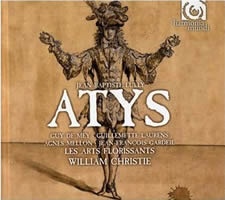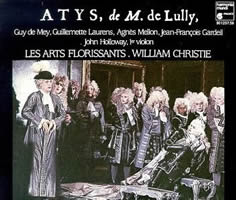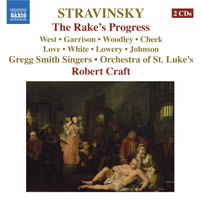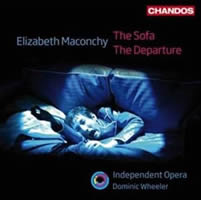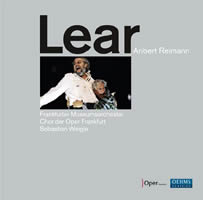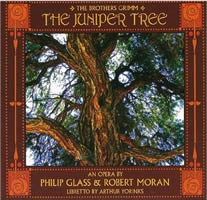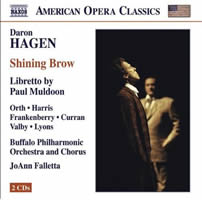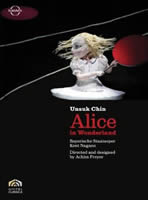Armchair Operas 4.
|
Grant Chu Covell [October 2009.]
Jean-Baptiste LULLY: Atys (1676). Cast includes: Guy de Mey, Guillemette Laurens, Agnès Mellon, Jean-François Gardeil, Jacques Bona, Bernard Deletré, Isabelle Desrochers, Jean-Paul Fouchécourt, Véronique Gens, Michel Laplénie, Stephan Maciejewski, Gilles Ragon, Noémi Rime, Françoise Semellaz, Arlette Steyer, Monique Zanetti. Choeur et Orchestre Les Arts Florissants, William Christie (cond.). Harmonia Mundi HML 5901257.59 (3 CDs) (http://www.harmoniamundi.com/). I recall when this 1987 recording first appeared, suddenly illuminating a forgotten genre. The French Baroque gestures made a strong impression, and I subsequently trusted Christie and Les Arts Florissants for period favorites, such as Charpentier’s Te Deum (HMA 1951351). I remember the troupe passing through Boston with Purcell’s The Fairy Queen, which the Boston Globe’s mean-spirited review of May 13, 1992 damned for essentially provincial reasons. Twenty years on, this recording is still vivacious and elegant. Adapting an Ovid tale, Lully’s tragédie en musique is a lengthy 2:50:39. While the Louis XIV idolatry is a bit much, this Atys entrances more than other, more recent products such as Psyché (cpo 777 367 2) and Thesée (cpo 777 240 2). Christie coaxed an unsurpassed crispness from his band. Few choruses since sound so lusty and bright. Harmonia Mundi has not skimped on this commemoration of Les Arts Florissant’s 30th year. The three discs are accompanied by a substantial 188-page book and libretto. An essay discussing the 1987 production’s reception replaces Jean Duron’s five “discovered letters” purportedly written by someone privy to Lully, librettist Quinault, and the King’s court. Glancing over the roster reveals familiar names: Christophe Rousset, Stephen Stubbs, John Holloway, Mark Minkowski, Véronique Gens, Isabelle Desrochers, Jean-Paul Fouchécourt, et al. I understand the need for a new cover, but the white wigs, makeup and silvery robes did set a mood.
Igor STRAVINSKY: The Rake’s Progress (1951). Cast includes: Jayne West, Jon Garrison, Arthur Woodley, John Cheek, Shirley Love, Wendy White, Melvin Lowery, Jeffrey Johnson. Gregg Smith Singers, Orchestra of St. Luke’s, Robert Craft (cond.). Naxos 8.660272-73 (2 CDs) (http://www.naxos.com/). I confess to a failure to understand the appeal of this iconic neo-Classical Stravinsky opera. It has always sounded to me like Mozart and Rossini pulsed in a food processor. Perhaps the fine Auden / Kallman libretto ensures its durability. Craft’s revealing notes detail his involvement from the moment Auden handed Stravinsky the text. This recording does captivate more than others, Gardiner’s DG 459 648 2, for example. West’s Act I, Scene 3 cabaletta, “I go, I go to him,” is marvelous. [My allegiance to the composer-led 1964 Rake lives on, for Alexander Young’s Tom and Colin Tilney’s harpsichord. In his 22-disc Works. W.M.]
Elizabeth MACONCHY: The Sofa (1956-57); The Departure (1961). Casts include: Nicholas Sharratt, Sarah Tynan, Josephine Thorpe, Alinka Kozári, Anna Lesse, Patricia Orr, Patrick Ashcroft, George von Bergen, Samuel Boden, Michelle Daly, Jassy Husk, Simon Lobelson, Tom Oldham, Kate Symonds-Joy, David Webb, Louise Poole, Håkan Vramsmo. Independent Opera at Sadler’s Wells, Dominic Wheeler (cond.). Chandos CHAN 10508 (1 CD) (http://www.chandos.net/). Distributed in the US by Naxos (http://www.naxos.com/). Chandos’ single disc offers two neatly contrasting brief operas (39:01 and 31:00) from an underrepresented composer. Each may disturb: The Sofa concerns an idler transformed into a piece of furniture that must remain transformed until it’s used as a location for sex. In The Departure, a woman wandering through her home wonders why her family behaves strangely until she recalls her fatal accident. The first opera’s libretto is by Ursula Vaughan Williams, the second by Anne Ridler. This is The Departure’s premiere recording. Both scores, which flirt with popular music, are hard to peg as mid-century compositions. Maconchy’s gender and dissonant language blocked easy success; perhaps this release will spark a reappraisal. The wistful The Departure, relying on its two leads (Poole and Vramsmo), is perhaps harder to bring off than The Sofa’s overstuffed ensemble.
Aribert REIMANN: Lear (1978). Cast includes: Wolfgang Koch, Magnus Baldvinsson, Dietrich Volle, Michael McCown, Hans-Jürgen Lazar, Johannes Martin Kränzle, Martin Wölfel, Frank van Aken, Jeanne-Michèle Charbonnet, Caroline Whisnant, Britta Stallmeister, Graham Clark, Chad Graham, Nicolai Klawa. Chor der Oper Frankfurt, Frankfurter Museumsorchester, Sebastian Weigle (cond.). Oehms OC 921 (2 CDs) (http://www.oehmsclassics.de/). Distributed in the US by Naxos (http://www.naxos.com/). Few would deny that it takes a special opera to improve upon Shakespeare. Dietrich Fischer-Dieskau prodded Reimann into composing Lear and premiered the title rôle in 1979, which DG 463 480-2 captures with the Bayerische Staatsoper under Gerd Albrecht. For Reimann’s devastating Lear, Claus H. Henneberg reduced the Bard’s material into two parts, thus distilling the play’s nastiness. Bad things start happening straight away: Cordelia, for example, is banished in the first minutes. Lear bears a resemblance to Wozzeck and Die Soldaten. Should you prefer DFD’s velvety command, then Koch will seem rough, although he’s capable and commanding. The gritty score congestion makes it difficult to discern subtle differences with the older recording, although the percussion is more compelling in these live performances from the 2008 Frankfurt revival. DG offered Reimann’s helpful production diary and DFD’s notes. Oehms offers only a German libretto. I admit to being more enthusiastic about this opera a few years ago.
Philip GLASS and Robert MORAN: The Juniper Tree (1984). Cast includes: Jayne West, Sanford Sylvan, Lynn Torgove, Valerie Walters, Janet Brown, David Stoneman, Thomas Derrah, William Cotten. The Juniper Tree Opera Orchestra, Richard Pittman (cond.). Orange Mountain Music 0057 (1 CD) (http://www.orangemountainmusic.com/). Distributed in the US by Harmonia Mundi (http://www.harmoniamundi.com/). The Juniper Tree is a typically sinister Brothers Grimm tale with its evil stepmother, cannibalism, and revengeful dead child who returns to life. Glass and Moran’s music interleave across two acts, distinguishable and complementary. This release dusts off recordings made in 1985 at the world premiere with a cast of leading Boston talent. Moran’s wonderfully rendered music after the murdered boy’s return to life is especially lovely.
Daron HAGEN: Shining Brow (2006). Cast includes: Robert Orth, Brenda Harris, Robert Frankenberry, Matthew Curran, Elaine Valby, Gilda Lyons, Elem Eley, James Demler, Jennifer Lynn Reckamp, Tony Barton, Deborah Fleischer, Eric Fleischer. Buffalo Philharmonic Chorus, Buffalo Philharmonic Orchestra, JoAnn Falletta (cond.). Naxos 8.669020-21 (2 CDs) (http://www.naxos.com/). Frank Lloyd Wright was a genius who behaved badly with colleagues and family. Hagen’s fine opera circles around Wright’s break with his wife and pursuit of Mamah Cheney, a client’s spouse, and culminates with the fire and murders at Taliesin. Wright’s difficult relationship with one-time mentor Louis Sullivan provides a recurring counterpoint. With a two-act libretto by Paul Muldoon, Hagen’s style calls up mid-century American tableaux. In the notes, Hagen reveals how he and Bernstein would workshop the opera together. Hagen possesses the tools to carry off the effort. Unlike other recent operas touched upon in these pages, I find myself considering the content rather than its construction. At a climactic party scene, Hagen feeds in threads from Der Rosenkavalier as an elegant touch. It’s a bit distasteful when an artist operates by a different moral standard, particularly when Wright’s remorse remains ambiguous at the opera’s close. The music, creamy with an easy lyricism, reveals its fragility when supporting singers and chorus attempt to carry it.
Unsuk CHIN: Alice in Wonderland (2007). Cast includes: Sally Matthews, Piia Komsi, Julia Rempe, Dietrich Henschel, Andrew Watts, Guy de Mey, Cynthia Jansen, Gwyneth Jones, Steven Humes, Christian Rieger, Rüdiger Trebes, Stefan Schneider. Statisterie der Bayerischen Staatsoper, Chor und Kinderchor der Bayerischen Staatsoper, Bayerisches Staatsorchester, Kent Nagano (cond.). Euro Arts 2072418 (1 DVD) (http://www.euroarts.com/). Distributed in the US by Naxos (http://www.naxos.com/). While I’d prefer to like Chin’s music, to judge from this opera, it doesn’t sound fully baked. Ignoring for the moment the score’s generous borrowings from other operatic styles, it fails to cohere. I wouldn’t recognize Chin’s music anywhere else. A prior DG release (477 5118 2) certainly doesn’t prepare the way. With acrobats on wires, an alarmingly raked stage, Nina Weitzner’s creepy masks and occasionally outré costumes, Achim Freyer’s production is difficult to watch on DVD, owing largely to excessive short-range shots and playing about with focus. Alice in Wonderland’s innocent absurdities should be directed at philosophical conundrums. In disturbing contradiction, this production rubs our noses in the surreal and sexual, bookended by two bluntly Freudian dreams. Praise nonetheless to Matthews’ command of the acrobatic title rôle from behind a mask. Henschel and Watts deliver memorably as the Mad Hatter and White Rabbit respectively in this June 2007 premiere recording.
[Previous Article:
Album Tweets 3: Strange Arts]
[Next Article:
From a Pianist’s Working Diary]
|
